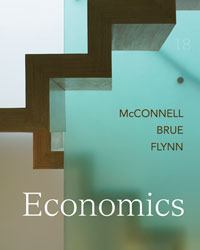
Economics (McConnell), 18th EditionChapter 15: Natural Resource and Energy EconomicsKey Questions1. Suppose that you hear two people arguing about energy. One says that we are running out of energy. The other counters that we are running out of cheap energy. Explain which person is correct and why. 2. Recall the model of non-renewable resource extraction presented in Figure 15.7. Suppose that a technological breakthrough means that extraction costs will fall in the future (but not in the present). What will this do to future profits and, therefore, to current user cost? Will current extraction increase or decrease? Compare this to a situation where future extraction costs remain unchanged but current extraction costs fall. In this situation, does current extraction increase or decrease? Does the firm's behavior make sense in both situations? That is, does its response to the changes in production costs in each case maximize the firm's stream of profits over time? 3. Various cultures have come up with their own methods to limit catch size and prevent fishery collapse. In old Hawaii, certain fishing grounds near shore could be used only by certain individuals. And among lobstermen in Maine, strict territorial rights are handed out so that only certain people can harvest lobsters in certain waters. Discuss specifically how these systems provide incentives for conservation. Then think about the enforcement of these property rights. Do you think similar systems could be successfully enforced for deep sea fishing, far off shore? |  |















